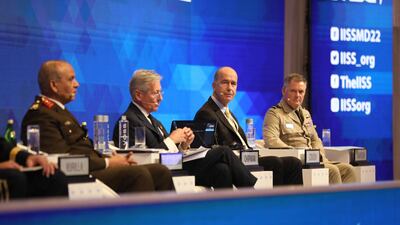The Government of the Kingdom of Bahrain and the International Institute for Strategic Studies held the 19th Manama Dialogue over the past weekend in what has become the region's premier annual regional security conference.
Given the volatile and complex state of global affairs, there are naturally numerous observations from the conference, yet one stands out in particular is that western powers, both US and European, appear intent on demonstrating the depth and durability of their security partnership with the region.
At the conference, more than one visiting official went to great lengths to showcase different areas of defence and security co-operation with regional allies, underscoring their commitment to the region’s security.
This was partly to curry favour with the hosts of the conference – understandably so, but it was also intended to dispel concerns about the reliability of this partnership. The so-called pivot by the US towards the Asia-Pacific, the drawdown of US troops from the region and the Joint Comprehensive Plan of Action or the nuclear deal, are what initially triggered these concerns. Growing US energy independence also fuelled them. The combination of these developments seemed to suggest that the region was no longer a priority, given the growing list of other priorities.
Past attacks against GCC countries that did not elicit any response from the US also shook the partnership. The impression that the region is no longer a priority is still strong in the region, even if it is not rooted in fact. The region’s enduring importance is unlikely to change because of the maritime routes it borders, its central role in energy markets and its western-oriented economies. Yet sometimes impressions appear more important than facts.
For the skeptics in the audience though, this message was also interpreted as serving a dual purpose; it comes with an expectation of reciprocity, especially when it comes to Russia. On the issue of impressions, there is a strong one in the West – that countries in the region are adopting a position of “strategic neutrality” and are either hedging their bets or making light of the violation of international laws and norms that the invasion represents. To drive this point home, at least two European speakers drew parallels between the Iraqi invasion of Kuwait in 1990 and the Russian invasion of Ukraine.
Most countries in the region have already taken quite a strong stance to condemn Russia’s actions. However, they believe a negotiated settlement, and not a military one, will be the only lasting solution to the conflict.
The West might not buy this; in the same way that the region may not buy that their concerns vis-a-vis Iran are shared with the West, despite assurances given in Manama and elsewhere. As an example from the conference that sums this up succinctly, one conference delegate pointed out that Russian forces were using Iranian drones in Ukraine at the same time that the P5+1 was contemplating ways to revive the JCPOA, a comment which did not elicit acknowledgment from the speaker.
Some have argued that the US and European roles in the region are fundamentally changing because of issues of reliability. A more likely explanation is the absence of an organising principle for this role or the relationship, similar to that of containing Soviet expansion and counter-terrorism in the past. If, on the other hand, West-China competition will be the organising principle of international relations for decades to come, it is not clear where the region fits into this. Could it be the case that an Asia pivot hinges on the Middle East?


